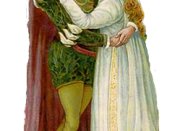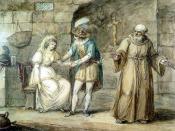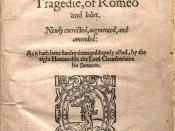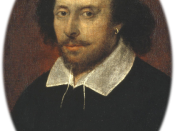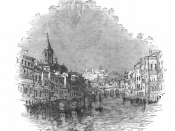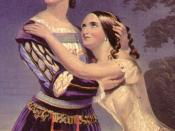William Shakespeare is considered the greatest poet and playwright of all time. He gained this fame for his excellent use of words and he is very well known for his creation of tragic heroes. Shakespeare created the tragic hero and there are a few rules and ways to find the tragic hero of a story. A tragedy created by Shakespeare "is, in fact, essentially a tale of suffering and calamity, conducting the hero to death." In many of Shakespeare's plays that have tragic heroes, he has the characters present a side of themselves that shows some sort of insanity, and he also includes things that are supernatural. Shakespeare was born at Stratford-upon-Avon, in England, and was the eldest son of eight children. Five years after being married at the age of eighteen, he left for London to work on his writings. There he wrote 38 plays and hundreds of sonnets, the most famous of which are tragedies.
Two of his greatest tragedies are Romeo and Juliet, where the tragic hero is Romeo, and Julius Caesar, where the tragic hero is Marcus Brutus.
William Shakespeare was born April 23, 1564 at Stratford-upon-Avon. He was born to John and Mary Arden Shakespeare. His father was a tradesman and Alderman of Stratford. Many people assume that Shakespeare was born to a rich and powerful family because of his immense success. However, in his time, his family was considered to be middle-class. He was the oldest son, and third, of eight children. Even though Shakespeare never attended a University, he did attend a very strict grammar school located in his town, where he learned mainly Latin. He went to school almost nine hours a day and nearly all year. His interest in writing at such a young age is credited to the plague in England that occupied when he was just eleven years old. This plague sent Queen Elizabeth to Kenilworth Castle, which is near Stratford. The queen coordinated festivities, which prompted William Shakespeare to become interested in performing and writing. At the young age of eighteen, Shakespeare married an older woman, Anne Hathaway, who was 26. Such a marriage was very uncommon in those days. She gave birth to their first child, Susanna, just six months after their marriage. Just three years later, Anne gave birth to twins, Judith and Hamnet, who died at young ages in their childhood. William Shakespeare moved to London in 1595, where he began to write plays and sonnets. He also performed in many plays, as a part of Lord Chamberlain's Men. In 1611, Shakespeare retired from writing and went home to Stratford to live with his wife. Just five years later, William Shakespeare died on April 23, 1616, exactly 52 years following his birth.
William Shakespeare developed his tragedies and set up certain rules to go along with them. In all of Shakespeare's plays, the tragic hero is usually one man. However, an exception takes place when he wrote love tragedies where the heroine is a part of the tragedy. The story is written around the tragic hero and involves the rising action to the death of the hero. "Shakespeare's tragic heroes will be men of rank; the calamities that befall them will be unusual and exceptionally disastrous in themselves." Shakespeare also adds abnormal and supernatural events, such as omens or warnings from the gods, to add action and clarify what is happening. The tragic heroes are usually compared with previous happiness or glory. "The hero falls unexpectedly from a high place, a place of glory, or honor, or joy, and as a consequence, we feel that kind of awe at the depths to which he is suddenly plunged." This technique shows that a character has his downfall from a tragic flaw. A tragic flaw is when a person has a good trait but they take it to an extreme, causing their downfall.
The plays, Romeo and Juliet and Julius Caesar, are two stories of great tragedy and tragic heroes or heroines. The play Romeo and Juliet, is a play about two young lovers. They meet just once and instantly fall in love. In this tragedy, the tragic hero is Romeo. Romeo demonstrates and conveys all of the necessary characteristics of a tragic hero. In the play Julius Caesar, Shakespeare shows the audience a man who shows every single aspect of a tragic hero. Even more evident is Shakespeare's use of a tragic personal flaw in the tragic character, which is Brutus. His love for Caesar is apparent but his profound love for Rome is even more evident when he goes through with the murder of his supposed best friend. In these two plays, the tragic heroes are doomed with a personal flaw or characteristic that causes their downfall. These two characters have all of the elements necessary to be tragic heroes: high rank, originally good, involved in a conflict, tragically flawed, ultimately becomes isolated, and finally the tragic hero dies from the conflict.
The two plays being examined, Romeo and Juliet and Julius Caesar, are two plays that both include tragic heroes. In Romeo and Juliet, Romeo displays all of the characteristics of a tragic hero, particularly the tragic flaw that leads to his downfall. Romeo's tragic flaw is his youthful obsession of love. "A pair of star-cross'd lovers take their life."(Prologue) The whole play, Romeo and Juliet, is based on the two young lovers and their ultimate destiny, which they end up taking from each other, their lives. These two young lovers go through very intense emotions at such a young age. "Although it is marked by intense passion and although it's tragic course is at least in part due to the most irresistible of all emotions"æ" Julius Caesar, unlike Romeo and Juliet, does not have anything to do with the love between a woman and a man. Instead, we see a man torn between the love of his country and his best friend. Brutus' ultimate tragic flaw is that he is over-trusting. One critic said, "Brutus' only flaw is his too strict adherence to the virtues he possesses." This quote infers that Brutus will not accept those who cannot do everything perfectly. However, Brutus tends to follow what others do and try to persuade him to believe. The critics' only support on this issue is that Brutus does convey a character that feels that his nobility and perfection is above everyone else.
The first requirement for a tragic hero is that the character must be of high rank or social class. Both Brutus and Romeo fulfill this first requirement. Romeo was a part of the two feuding upper class groups--the Montague's and the Capulets. Romeo was part of the Montague's; seeing as he was the son of Montague. Brutus is also a character of high social class. "Hence! Home, you idle creatures, get you home!"(I,i,1) A person of the upper class said this; this is how Brutus and all of the others spoke to those of the lower class. He also thought very highly of himself as said before. Very often, Brutus and many others called him the noblest Roman. "Well Brutus, thou art noble."(I, ii, 320) From everyone always calling Brutus noble, he gained the knowledge that nothing that he did was wrong and he convinced himself to believe that everything that he did was the best thing to do.
In Romeo and Juliet, Romeo is a good-natured character. Romeo means well; he is just always in love with someone. However, he finally found a girl that he is desperately in love with. At the beginning of the play, we see Romeo's first love affair with Rosaline, has just ended. Here Romeo is acting very down and his friend Benvolio is trying to help him, "In Love?" Romeo replied, "Out-," then Benvolio asked again, "Of love?" Finally, Romeo responded back, "Out of her favor where I am in love."(I, i,170-173) Just a little later, Romeo had fallen in love with a girl that he had met just once. Romeo had fallen in love with a girl who feels the, "love that embraces Juliet embraces everything that Juliet touches or that touches her." She also shows this emotion while talking to Romeo, "And yet I wish but for the thing I have. My bounty is as boundless as the sea. My love as deep. The more I give to thee, the more I have, for both are infinite."(II,ii,139-142) Romeo finds a girl who so impressed with anything he does and she falls in love with being in love just as much as he does. Romeo's flaw is more tragic because of Juliet's willingness to do anything for him and her endless adoration.
Julius Caesar is a story mainly about the end of his life. A majority of the story is about Brutus overcoming his fear and worries about being a part of the conspiracy against his friend, Julius Caesar. Brutus is also a good-natured person; but he does often trust people too much with his opinions and he say things to people that he should not. The first instance was when he said, "What means this shouting? I do fear the people choose Caesar for their king."(I,ii,85-86) This is the first time that Brutus breaks down and shows how is too trusting of people. This trait surfaces again later when Brutus trusts Antony at the funeral. Antony became an opportunist and took advantage of Brutus allowing him to speak at Caesar's funeral. Brutus trusted that Antony would just speak of Caesar, but instead he "turned the mob against Brutus." However, Antony still thought of Brutus, "This was the noblest Roman of them all."(V,v,74) Because of Brutus' misplaced trust in Antony, he gave Antony a perfect way to destroy his life, which he ultimately did. Antony turned the Romans against Brutus, which eventually led to a war that resulted in the death of Brutus. This series of events also fulfills another requirement for a tragic hero, which is that they are involved in a conflict. Brutus, as mentioned before, becomes a part of the conspiracy and fights a war at the end of the play.
Romeo is also well involved in conflict. He feels torn between the two families, he has been banished from the town of Verona where Juliet is, and at the end he is told that his wife and love had died. Romeo's first conflict, which had started from the very beginning, was the simple fact that he was a Montague and Juliet was a Capulet. Because the two families were feuding, the two had to keep their wedding and love for each other a secret. However, Shakespeare did not let this ruin these two loves and did not make this the main conflict. "The feud between the Capulets and Montagues had to do with it incidentally, the tragedy of this play flowed immediately from another cause entirely." The more significant tragedy is Romeo's banishment. Romeo shows his youthful way of showing love when banished from Verona. He deals with the situation, without thinking of ideas or ways to resolve it, he just jumps to conclusions. "Ha, banishment? Be merciful, say "death," for exile hath more terror in his look, much more than death. Do not say "banishment""æThere is no world without Verona walls, but purgatory, torture, hell itself"æWhere Juliet lives, and every cat and dog"ælive here in heaven and may look on her, but Romeo may not."(III,iii,13-34) Banishment completes the final requirement for a tragedy. Romeo becomes isolated and can no longer see his love and deal with the situation that he is facing. Finally, Romeo finds that his Juliet had died. He rushes to her side. "It is all like a dream, or madness." Paris, who thinks Romeo is going to desecrate the bodies, confounds Romeo. The two duel, and Romeo kills Paris without even knowing it is he. Romeo lays Paris in the tomb with Juliet at his request. Romeo then kills himself by drinking poison, thinking he will now be beside Juliet forever.
The play, Julius Caesar, also shows the banishment that occurs to the tragic hero when dealing with the conflict that brings out his flaw. When trying to decide whether or not to join the conspiracy, Brutus isolates himself thinking long amounts of time about his decision. Even his wife, Portia, worries about his time spent alone and talking to himself. "Stole from my bed. And yesternight at supper you suddenly arose and walked about"æand when I asked you what the matter was"æI insisted; yet you answered not."(II,i,259-265) This became his isolation period in the play. Following this period, Brutus trusts Cassius and his words and agrees to join the conspiracy. He is convinced that he is joining this because he would not allow Caesar to, "climber-upward"æhe then unto the ladder turns his back onto the people of Rome"æ"(II,i,24-26) In other words, he would not let Caesar turn his back on the people of Rome. Brutus' actions prove he loved Rome more than he had loved Caesar.
Shakespeare did in fact create two tragic heroes, both Romeo and Brutus. The both let their tragic flaws lead to their downfall and even death. Romeo let his youthful way of loving lead him to death and Brutus was too trustworthy which also led to his death. Throughout these two plays, the conflicts that the heroes were facing brought out the elements needed to complete a Shakespearean tragedy. Many critics become confused especially in Romeo and Juliet of whom the tragic hero is, often thinking that it is Friar Lawrence. However, they forget one of the most key requirements to completing a tragedy, which is that the character has to die. Confusion is also shown in Julius Caesar from many people who think automatically that Caesar is the tragic hero of the play. Forgetting that he does not display the characteristics but is "the center of Brutus' thoughts" However, these two characters display all of the elements that a tragic hero should display and accurately display all of the elements needed to fulfill a tragedy.
BIBLIOGRAPHY A. Books Bloom, Harold. William Shakespeare: The Tragedies. New York: Chelsea House Publishers, 1985.
Brown, John R. Shakespeare and His Theatre. New York: Lothrop, Lee, and Shepard Books, 1982 Jorgensen, Paul A. William Shakespeare: The Tragedies. New York: Twayne Publishers, 1985.
Shakespeare, William. Julius Caesar. New York: Washington Square Press, 1992.
Shakespeare, William. Romeo and Juliet. New York: Washington Square Press, 1992.
B. Internet Bradley, A.C. Shakespearean Tragedy. Internet WWW page at URL: Dietschi, Ben. Shakespeare's Career. Internet WWW page, at URL: (version current as of 1999) Julius Caesar: Critical Commentary. Internet WWW page, at URL: Justin. Tragic Hero of Romeo and Juliet based on Friar. Internet WWW page, at URL: Lou, Mary. Juliet's Character. Internet WWW page, at URL: Smith, John. Julius Caesar. Internet WWW page, at URL:
